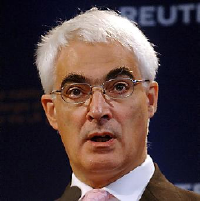I thought yesterday’s pre-budget report was a feeble response to the Government’s ongoing £178 billion-a-year borrowing binge.
These are unprecedented times, true. But that means they call for an unprecedented, apolitical response that we could swallow hard on but stomach, not a pre-budget report that sounded more like Rimmer from Red Dwarf doing the bowling club’s finances.
Yes, Darling shouldn’t cut spending too soon. Yes there are uncertainties.
But you can create a framework to explain how tax and spending will alter as various inputs and outputs in the economy change, to give us – and the markets – a sense of how Government sees the scale of the problem and how it will implement the sacrifices required, as well as of the light at the end of the tunnel.
Companies do this kind of thing all the time, but it seems to be beyond politicians, presumably because they need to win elections but also perhaps because they believe in idiocies like their ‘abolishing boom and bust’.
What we actually got yesterday was largely pre-election faffing, fudged figures, and a morally justifiable swingeing tax on bankers’ bonuses that was used as a smokescreen for the 0.5% National Insurance rise (really a 1% N.I. rise, as it comes on top of an already announced 0.5% hike).
Lifting N.I. is a tax on 10 million jobs just as the country noses out of recession. This Is Money has produced a table showing how much different salary bands will pay after the N.I. hike:
Even Darling’s traditional ‘one last thing’ end of speech sweetie bag was anti-climactic – half the tubby kids who’ll get their free school meals extended would probably prefer to be eating chips and Mars bars anyway.
About the only good news for Monevator readers – bankers or not – was the unaltered 18% capital gains tax rate.
As Mathew Vincent points out in the FT, the CGT rate is 34% less than the highest rate of income tax, meaning that there hasn’t been such an incentive to spend time managing your assets as well as your income since the 1970s.
As for addressing the real issues, particularly public spending, look at yesterday’s Irish budget to see how difficult decisions can be made.
The pre-budget 2009 roundup
What does everyone else make of pre-budget report? I’ve rounded up a big bunch of reports below for your reading pleasure.
Newspaper summaries and views
- All the key pre-budget changes at a glance – The BBC
- Another key points page, with economic emphasis – The FT
- National Insurance hike: What it will cost you – This Is Money
- Key points with commentary – The Times
- Darling has postponed reality – The Times
- Round-up page about the key measures – The Telegraph
- Rich or poor? Case studies – The Independent
- Little for jobless or unemployed – The Guardian
- Darling defends his pre-budget report – The FT
- Public sector is paying with pay freezes – The FT
Some other blog’s responses
- Time to hug a banker? – Robert Peston
- The budget Britain needs was delivered in Ireland – Guido Fawkes
- What PBR? It was only politics – Captialists@Work
- Darling’s spending plans: tough or not? – Stumbling and Mumbling









Comments on this entry are closed.
Weren’t you impressed by the 2% reduction in bingo tax??? I think this was the key to Alistair’s “Securing the recovery: growth and opportunity”.
Good news for Rank Group, Gala Bingo etc shareholders. I couldn’t see any other opportunities.
Joking apart, what a shame.
Indeed. Perhaps Darling intends to win back the national debt by being lucky in Saturday night Macclesfield.
Wot no Bash the Bankers? I’d visited Monevator specially to see you dancing a victory gig.
Haven’t change your mind they deserve it, Monevator?!
Hi OldPro, nice to see you back. 🙂 I’m going to do a quick post on the subject of the bonuses bashing, as a couple of people have raised it. Hang about.
Bit of a non-event as far as I was concerned, I’ve posted some thoughts here: http://money-watch.co.uk/6124/pre-budget-report-thoughts-expert-analysis
As expected, politics were to blame for this wishy washy pre-budget report, according to news coming out of the BBC: